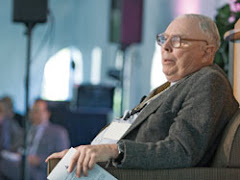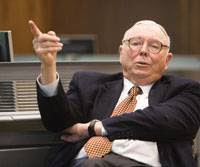A Conversation with Bambi: Putting Back Value in Investing on September 26, 2009 at the ICA MPH1, from 2-6pm.
Free for all alumni, fee of 100 for non-alumni and guests. Hope to see you!
For registration, you may contact:
ICAAA-Jingle/Joy: 7212687
AAXS – Imee/Sally: 727-3329 or 726-4855
------------------------------
Putting Back Value in Investing
CFA Philippines 2009 President, Xavier Alumnus and value investor Vandermir Say, CFA will join us in a candid discussion about the basics of investing and the determination of intrinsic value. His employment in giant banks (UBS AG, Citigroup) led him to a soul-searching journey that resulted in finding his preferred investment style. A student of the Warren Buffet - Charles Munger philosophy, he advocates the "Value Investment Style" and warns against investing in securities or funds that few in the world really understand. Currently, he runs Wimax Phils. Inc. and a private investment consultancy that manages wealth for individuals.
So, where should we invest? Is there a perfect time to invest? What are the questions we should ask bankers? And what are the red flags to watch out for when presented with investment offers?
In a casual Q&A, we shall explore investment ideas, understand the different financial crises, and avoid investment traps. Ask questions you've been afraid to ask your bankers and investment speakers.Control your financial health!
Questions for Bambi:
Basic Investing
History of Value Investing
FAQ's:
1. What are some helpful tips for investing in stocks?
2. What are the different financial investments?
The Meat of Investing
The 2 kinds of errors
Is there a good investment and a bad investment
1. Are life/medical/educational plans good investments?
2. Are properties good investments?
3. How does one get into equity investment? How much should
we start with? What about wealth investment?
4. What goals should we set for investing? What should be
our timeline?
Investment Traps and Pitfalls
1. What are the first questions we should ask bankers or
investment sellers?
2. How do we avoid situations like PET Plans, the Madoff
scandal, and other hedge fund scandals?
Warren Buffet and Charles Munger
1. What do they have to say about investing?
2. How do we put their ideas/principles into practice?
Thursday, September 24, 2009
ICAAA and AAXS invite you to a joint fellowship: A Conversation with Bambi
Wednesday, May 13, 2009
Friday, April 3, 2009
Seth Klarman - HBS Bulletin
Seth Klarman
President, The Baupost Group
by Roger Thompson
Klarman
Illustration by David Cowles
While other money managers scrambled to survive the financial market meltdown, value investor extraordinaire Seth Klarman (MBA ’82), president of The Baupost Group in Boston, cautiously pursued buying opportunities. After sitting patiently on the sidelines with a mountain of cash — 40 to 50 percent of Baupost’s $14 billion–plus in assets — for several years, the firm’s recent investments have cut its cash stash in half. Distress selling, it seems, breeds the kind of bargains Klarman lives for.
Fresh out of HBS, Klarman didn’t hesitate when Adjunct Professor Bill Poorvu recruited him to help manage a $27 million pool of capital in the newly formed Baupost. While the starting salary was an underwhelming $35K, it turned out to be the opportunity of a lifetime. In 26 years, Baupost has racked up an enviable 20 percent annual compound rate of return, earning Klarman entry into the Alpha magazine Hedge Fund Hall of Fame. The firm has grown from 3 to 100 employees.
A consummate team player, Klarman rarely uses his private office, choosing instead to sit at the trading desk where he works closely with analysts on investment decisions. But work isn’t all-consuming. He makes time for family and outside pursuits. As his three children grew, he coached his daughters’ soccer teams and attended his son’s recitals. And he is deeply committed to a number of philanthropic causes. Klarman recently took time to discuss investing, the credit crisis, and his approach to philanthropy.
When you started with Baupost at age 25, did you already consider yourself a value investor?
Yes. After my junior year in college and right after graduating, I worked for Mutual Shares Corporation, which was run by a wonderful gentleman named Max Heine. I learned a huge amount about value investing. It turns out that value investing is something that is in your blood. There are people who just don’t have the patience and discipline to do it, and there are people who do. So it leads me to think it’s genetic.
Did you ever waver in your investment style?
Never once.
What gave you the resolve to say no to all the other investment approaches?
There are several answers. First, value investing is intellectually elegant. You’re basically buying bargains. It also appeals because all the studies demonstrate that it works. People who chase growth, who chase highfliers, inevitably lose because they paid a premium price. They lose to the people who have more patience and more discipline. Third, it’s easy to talk in the abstract, but in real life you see situations that are just plain mispriced, where an ignored, neglected, or abhorred company may be just as attractive as others in the same industry. In time, the discount will be corrected, and you will have the wind at your back as a holder of the stock.
Do you set an annual return target?
We think it’s madness to target a return. Return lies in some relationship to risk, albeit there are moments when it’s out of whack, when you can make a high return with very limited risk. My view is that you can target risk versus return. So you can say, I’ll take the very safe 6 percent, I’ll take the somewhat risky 12, or I’ll take the enormously risky 20, knowing that 20 might actually be minus 20 by the time the actual results are known. We just don’t think targeting a return is smart.
You are lead editor of the new edition of Security Analysis, the bible of value investing by Benjamin Graham and David Dodd, first published in 1934. Is their advice still relevant 75 years later?
At no time since 1934 has it been so relevant given the financial turmoil and distress in the world and the possibility that we could be reliving some sort of serious economic downturn. What’s wonderful about Graham and Dodd is that their advice is timeless. And it is not just about investing; it’s also about thinking about investing. It basically teaches you the questions that you should ask, and it makes endless references to the foibles of human nature in the markets.
Given the recent credit market meltdown, have we made much progress in figuring out how to avoid the pitfalls pointed out by Graham and Dodd?
No. What happens is that people always want to believe that this time is different, that there’s something new under the sun, and that through their own ingenuity they can wish away risk. The idea that risk premiums would go to zero, that we’re somehow overcoming human nature, is absurd. The whole reason that our capitalist system works the way it does is because there are cycles, and the cycles self-correct. With too much excess, eventually you get a downturn.
So the explosion in securitized assets was a ticking time bomb?
It’s not amazing that securitized products were created. There are huge financial incentives for the people involved. What’s amazing is that anybody actually bought them. That’s because they’re created with a one-dimensional idea of what the economy and the world are going to do. If you have nothing but good times, then securitization makes tremendous sense. But securitization, for all of the commingling and diversification it gives you, also gives you a lack of transparency. So if you have an environment like the one we have now, the assets that have been securitized actually make you worse off than if they were just held as whole loans.
The unanswered question is how did the smartest people in the world who run the major Wall Street firms not understand that these products were toxic and end up getting caught with them on their books?
As Fed chairman, did Alan Greenspan have a hand in creating the current credit market crisis?
Until recently, Greenspan seemed unaware of his role in influencing markets. As Fed chairman, when he advised people not very many years ago to take out variable rate mortgages, he aided and abetted the housing market excesses. When he said there was irrational exuberance in the market [in 1996], he was basically right. But then he didn’t act even though he had plenty of levers he could have pulled that didn’t have to do with changing interest rates. He could have raised margin requirements, for example. But instead, he came up with the ridiculously lame idea that bubbles need to be allowed to run and that the Fed can clean up the mess afterward, which only had the effect of inflating subsequent bubbles, most notably the housing bubble that came as a result of the easy money. So he’s just been unaware of the impact of his encouragement, and his inaction got us into the terrible mess we’re in today. It’s not all his fault, but I hold him largely responsible for it.
How have Ben Bernanke and Henry Paulson (MBA ’70) done in managing the financial crisis?
They have been dealt an unimaginably bad hand. If any of us were in their shoes, we would be doing similar things, although it is reasonable to assume that part of the problem we are facing today is a result of previous government actions, and today’s government actions will give rise to future problems as well.
The lesson should be that we need to get to a point where we don’t need to intervene in the future, because we realize that intervention also delivers incredibly dangerous messages and creates a giant moral hazard. Bernanke and Paulson have to realize that if we’re going to intervene when things are bad, we’re also going to intervene when things are good and take away the punch bowl before the party gets too far along. One-sided intervention is even more dangerous. It will create an ever bigger bunch of excesses that will require an even bigger bailout next time.
Was the $700 billion federal rescue package, sold as a plan to buy toxic mortgage-backed securities from banks, the right way to go?
Defining the problem you are trying to solve is critical in knowing whether this plan will solve it. The bailout does almost nothing to solve the specific problem of declining housing prices. If the government really wants to tackle that problem, making capital available so that banks can make safe loans is crucial. Injecting $250 billion into the nation’s banks is a big step in that direction.
How do you approach philanthropy?
I’m a big believer in giving back. We all have an obligation to leave things better than where we found them.
I have more than I’ll ever need, and more than my family will ever need. I’m only working now for philanthropy. So everything I do is about giving back. In fact, one of the things we did at Baupost when we recently took on some additional clients was to accept only educational endowments and foundations. We figured we would further benefit the world by helping these organizations rather than individuals. That decision was very important for me and for all the firm’s partners.
Also, given the extremely difficult financial environment we are in, I expect charities will be greatly affected. That’s why it’s incumbent on those who can to step up and help fill the void.
Philippine Buffetteers off to Omaha!
We can't wait to read about their experiences in Omaha.
Saturday, March 7, 2009
Team CFA Philippines makes it to the Final Four in Singapore!
Team CFA Philippines will compete against Singapore, China and New Zealand in the Finals in Singapore, today.
Sunday, January 18, 2009
Buffet U - Fox Business (Transcript not completely accurate)
WEB on Finding Business Managers:
" I ordered trying to pick out the best manager in this group and under. While everybody. Showed up today we got a 162 ourselves. I can't I I can't tell which one is about I think if you test. Again interview each for ten minutes and rank you. But we -- businesses. Where the managers come -- them almost all the time so when we bought furniture mart. What a three year old -- but I knew that sought under the grandsons and tour and she wasn't going to change. When she's only the business I mean she loved her business. And all I have to do is make sure I don't mess up and I can I I can't improve well the Balkans and the furniture mart. I can take away their enthusiasm for running a prime example you know spend an hour day flag reports and reporting -- some group vice president royalties and they're an atomic forgot that all the money they -- if I had it to him all they loved his money. We're going to be on now. I I -- in their -- and for -- the business like the money at all. A lot of the business but -- the business. -- worked -- amber and I do."
On US Automobile Industry:
" We got Notre Dame. Wondered if we get hear your thoughts and I US auto market. Specifically what's going on in Detroit do you think that you -- for the GM Chrysler's. Should be allowed to fail perhaps reorganize under bankruptcy protection. Or do you think the government should be involved in bail out Turkey and gone down General Motors was the US economy I mean -- when I was. When I was about your age. General -- let everything I mean that would that it was it was the Bellwether for American business there's only two options. And -- option and they need a better business model. And I and you can get that through bankruptcy or you get it for negotiation. Very tough to negotiate I mean you've got. Unions who feel they've given up a lot which they have and they they bargained for those in the past -- agrees they got you is that they give up a lot you've got. You've got a illogical probably. Production and distribution system concern present market shares because they were set up. To be it in a much different situation I got more model -- but perhaps than it be all kinds of things. Now. If they want to bankruptcy. You'll have three separate bankruptcies when their collective kind of thing. Coming out emerging with a proper business model for American auto industry. Would be very very difficult I think if with a very strong president. I think. If I were president. I wouldn't. -- the heads of the companies. I would ask. They'll put to the head of the union. What I would ask -- that come up with the best business plan that possibly could come up whether. And I would -- that was some help from the federal government available. If I had a -- plan that I thought makes sense. And at that they thought made sense and make sure they thought it made sense. I would say to before people involved her power -- that war I would say I want you to put up 75% -- network or some number. And participate in this -- with the government I'll give you more upside so -- but it is some big bonuses but doesn't work out you lose 75% -- network and they. -- and -- a lot of money we got next Berkeley home. What advice would you give to you president elect Obama. To right the economy as well as getting everybody on board to do it required to do that well let. That's going to be a a huge and immediate challenge. Come January 20. You know I don't what you've seen as -- numbers and all -- lately but he said that. You know he's sort of standing back now because he says you know you only have one president of the time but I'm sure got one person that Mike. That that. We we really don't have anybody that's. We don't in effect we don't have a Bush Administration we may even have a -- administration -- could be closer to describe it. Obama will come again. On January 20 he will come men. When people desperately. Need. Kind of measure reassurance I mean there's no sense coming on the promise of that was going to change all -- president has changed much but they have to feel is going to change. In a reasonable time in the future and incidentally it will you know whether. The we we will be in fine shape. The insurer in five years but not in five months and were between depends a lot on policy and not a lot of things that you and I. But we don't understand now people like. Leadership and they they even if they disapprove of the month some specific points they want somebody. Delete them over the top of that next mountain who they think can see on the other side and they're willing want to follow and that. You can lose that but. All while I was very very good he's very smart very articulate. He's got a reassuring. Silent. Legacy and his policies will make sense of the they won't be there won't be magic bullets."
On Taking a Job and Passion:
"Who's next we've got them Berkeley next we want to rescue if you were in a position -- graduate students and really passionate about investing. And what would you do with would you go and IQ did when you're younger and work full mr. Ramos on some other solution I was -- exactly that position. In 1951 when I got out of Colombia and I loved investing I always loved it and and I what -- my professor that that -- Hamlet. -- and I offered to work form for nothing and he said your overpriced. "
" Forty years with a psychiatrist -- got bass. They ask about it but I did get going to work form right -- If you follow your passion you can't -- I mean this group if you think about it. You know if it got everything going for it got it got Granger got energy and you've got it got good schooling that it it's going to work add. Then the important thing to do as do. Is to find something that you loved doing every day when I went to work program. I would by the time government jobs for years later -- was daughter Omaha. I took the job in New York and the number and address we'll -- us by about what I was -- getting paid. When I first paycheck we treat me -- and it didn't make any difference that's what I want to do. And couple years later came back but. During that time. -- and everything else I've done and I jumped out of bed in the morning I was excited about what is going to do and and you know. Shirley -- is right Joel and watch you know -- and death you you know he ought to be doing with things with people -- likened. Doing activities everyday -- that I ice sold shirts and and underwear and that sort of thing at JC -- when I was. 161718. And you know I I I don't care how much they paid me. I didn't want to do address my life. So I would say that. One where they dive in the pool you don't go to work. If you if you can and I've realized that. -- those are going to work out as like perfectly for everybody the first time but. What it try to go to work for an organization -- individual that you admire and respect for your return on -- them and you don't want to be doing things that. Make you -- birdie at the end of the day here. So. I don't go to work for. Pick out our organization -- you like what they stand for a lot of people are and take the job and don't worry too much about our. I got in trouble of those non business school -- told a group -- you know go to work for. What they admire the most and got a call from the dean. Couple weeks later had done. What did you tell those kids who. As a go to work from my reminder of the most of what leveraged buy digital becoming self employed well. But without exception and I and I became self employed -- guilty of -- but the it's that there's really nothing like it and working with people you like in a job."
Wednesday, January 7, 2009
Morningstar - CEO of the Year 2008 - Warren B.
We have contemplated naming Warren Buffett CEO of the Year every year since we created the award, and this year we finally get the chance to officially acknowledge all that Buffett has done for Berkshire Hathaway
Beyond creating a company that treats common shareholders with the utmost fairness and respect, one needs only to look at the long-term value created at Berkshire Hathaway to see why Buffett deserves the award. Since taking the helm of the sleepy textile business 44 years ago and turning it into arguably the strongest conglomerate on the planet, Buffett and his managers have grown the book value per A share from $19 to just over $77,500, as of Sept. 30. This translates to a 20.7% annualized increase in book value since 1965, versus a mere 9.6% annualized return in the S&P 500 (including dividends) over the same time period.
And while 2008 was an exceptionally difficult year for just about all investors, it was much less trying on Berkshire Hathaway and its shareholders. Berkshire's balance sheet equity should be roughly flat from a year ago once the books are closed on 2008. More importantly, the competitive positioning and cash-flow generating ability of Berkshire's businesses remain robust.








